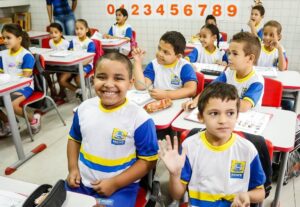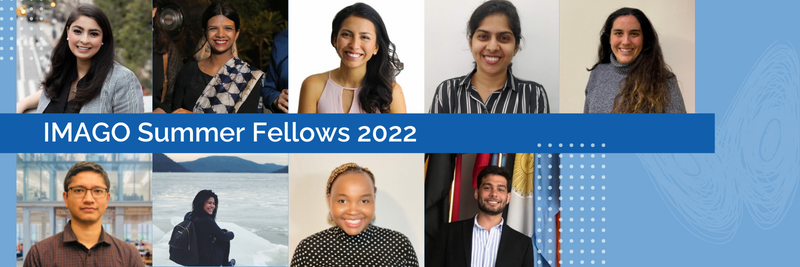
Working Paper
How Recife responded to the challenge of learning deficit...
May 12th 2025
School closures during COVID-19 caused learning losses worldwide, often compoundin...
Read MoreEach summer IMAGO is fortunate to welcome a cohort of Fellows from a variety of public policy schools to support the organization’s work and client projects. Summer 2022 marked the eighth cohort of fellows, and the largest yet. Each of the 2022 Summer Fellows brought their own unique energies and fire to IMAGO to make meaningful changes in the world they wish to see. Read more from the fellows below!

My name is Isabela Fonseca, I am studying at the University of Chicago and I am interested in International Development & Education. At IMAGO, I work on: scaling projects with IDB Lab and Poverty Stoplight, adaptive evaluation projects with CAEd in conjunction with the Education department of Recife and Instituto Gesto, and lastly a research project on women in leadership.
A: IMAGO works with many organizations who have clearly been reinvigorated by the fire that has been lit in the world. From Poverty Stoplight, which has pivoted to help people improve their situation during COVID, to Instituto Gesto which is looking to take “Teaching at the Right Level” to schools in the poorest part of Brazil, we can see these different organizations fighting to make a change despite all of the negative occurrences in the world. Poverty Stoplight is seeking to overcome the challenges that have been dealt by COVID (the health effects, psychological effects, and economic effects), and Instituto Gesto the challenges dealt by the current government cuts in education. With this, they tap into IMAGO’s specialty of scaling and adaptive evaluation to continue to improve their organizations and more effectively create the change that they seek.
A: My work at IMAGO has shown me all the different organizations who are working to improve the world. Particularly, in Brazil, I have been inspired seeing the work that different organizations are doing to improve the public education system. It’s invigorating to see organizations around the world working to make changes in systems that are so ingrained and hard to change.
My name is Sarah Nzau, I am studying at the Harvard Kennedy School of Government pursuing a Master in Public Administration in International Development (MPA/ID). I am interested in the administrative functionality of policies and programs aimed at alleviating poverty and promoting economic development. At IMAGO, I contribute to managing and streamlining processes in the Knowledge function.
A: IMAGO’s vision is to change development thinking and practices around poverty alleviation. The Knowledge function is essential for achieving this vision. Our internal knowledge database influences our work with current and future clients, and we are building the capacity to share our insights with the world. By doing this, we are fueling the fire to create change in the field of international development and in the communities we work with.
A: My work at IMAGO has solidified my interest in poverty alleviation. It has also shown me the importance of collaborating with organizations at different levels, from grassroots to multilateral to achieve similar goals. I came to IMAGO to learn about co-creating and implementing solutions to development challenges, and I gained more insight that will inform my career path.
My name is Vivek Kaila. I am studying at the Harris School of Public Policy at The University of Chicago, and I am interested in the political economy of development, specifically poverty alleviation and education policy in South Asia. At IMAGO I am working on the Scaling up RUDI project, which is focused on scaling up a rural agro-processing business model with the help of women’s collectives called Self Help Groups created within the framework of the National Rural Livelihood Mission. I am also working on the MLE Convergence project, which aims to exploit the complementarities of the government’s social and economic welfare schemes to improve livelihood outcomes in rural India.
A: The challenges of the new world are also accompanied by opportunities that never existed before. These opportunities present themselves in the form of technology, connectivity, and nimbler and more agile processes. The projects that I am involved with at IMAGO, which focus on improving women’s economic empowerment and agency in rural India, aim to unlock the full potential of pre-existing government initiatives to improve livelihood by bringing in new methodologies, tapping into complementarities, and streamlining existing processes.
A: I joined the IMAGO Summer Fellows Program with a desire to work at the grassroots in development. This has also given me exposure to the work done by grassroots organizations like SEWA and TRIF which has been invaluable, and helped confirm for me that this is indeed the work I wish to do going forward. I hope to continue to educate myself and gain greater experience working with social enterprises in this field.
My name is Claudia Rivas, and I am studying my second year of the MPA/ID program at the Harvard Kennedy School. As a Summer Fellow at Imago, I am currently working on the MOVE Evaluation project and the MLE Convergence.
A: In the past couple of months, I have come to learn about the power of cooperatives and the support system they bring to their communities. Before my internship, I had a very straightforward and simple idea of what a cooperative is and what they do. However, after working with SEWA, I have come to understand the values in which cooperatives operate, and how they can respond to crises, like the one we experienced with COVID-19, and be an anchor in times of uncertainty.
A: Learning about SEWA and talking to their staff has been truly inspiring. It has made me reconsider the role of cooperatives in society and reflect on how I can contribute to leverage or amplify their impact. Personally, it has also motivated me to think more collectively rather than individually.
My name is Ojas, I am studying at the Harvard Kennedy School and I am interested in designing and scaling innovative and equitable health systems that serve the last mile within developing countries. At IMAGO, I work on different projects, one of which is assessing and evaluating the scaling up of Poverty Stoplight and strategizing next steps for the organization. Additionally, I am working on the feminine leadership work in collaboration with Lever for Change, and also conducting independent research on successful last mile delivery models.
A: It has been a great experience to dive deeper into concepts like feminine leadership, and identify key strategies followed by innovative organizations and models that serve the last mile, but do so in a sustainable manner, and at scale. I think focusing on these ideas is key to understanding how we can approach (and tackle) the challenges of the current and future world.
A: Working with civil society organizations and understanding and supporting their vision has been a truly fulfilling experience. It has kept alive and fueled my passion of wanting to work with and within non-profits and social enterprises to amplify their approach which is both people-centered and systemic, and hence extremely impactful.
My name is Ignacia, I am studying an MPA at SIPA, Columbia University. I am interested in contributing to reduce poverty and inequality, especially in the most vulnerable groups of society. Accordingly, my focus in the MPA is on Social Policy, Development and Gender. At IMAGO, I first worked on scaling up processes. On the one hand, selecting one of the six organizations in Chile, through a scalability tool and interviews, to work on their scalability process. On the other hand, supporting the IDB Lab to better understand their concept of scalability and which factors have helped or hindered their projects to scale. Secondly, I was involved in a research study on inequality in Chile and citizens’ perceptions of inequality to contribute to the current discussion of the model of society in Chile. Also, in Chile we had an event with emerging leaders with Otto Scharmer. Finally, I participated in a literature review to support the process of adaptive evaluation of educational projects in Brazil.
A: My main work has been in Chile, where we are seeking to strengthen civil society in order to move towards a more egalitarian and just society. The most important aspect is that this process is done from and with the community, not with a top-down view of development. For this, IMAGO wants to support the scaling up of grassroot projects that contribute to an inclusive development in Chile. These projects have proven to have a positive impact on the citizenship and IMAGO’s contribution will be essential to grow in a sustainable way and that the quality of the projects is not affected by the quantity. Also, IMAGO has aimed to contribute to the leadership of emerging people who have not had the same space or facility to grow within Chilean society as other leaders, who often come from many more privileged backgrounds.
A: I have learned a lot working with IMAGO’s team these two months. Above all, IMAGO’s approach to development, from the community, with an inclusive look and seeking to promote projects that come from the community itself. This has contributed to my purpose of supporting communities, especially the most vulnerable ones. Furthermore, IMAGO has a team that embodies this philosophy and encourages us to continually learn from those around us. In other words, the same philosophy of adaptive evaluation is replicated in every internal IMAGO process as well. I believe that IMAGO is making a huge contribution to the world and is changing the perspective when thinking about the development of countries. This inspired me to keep learning and contributing to create changes in the world.